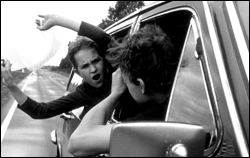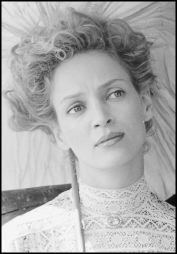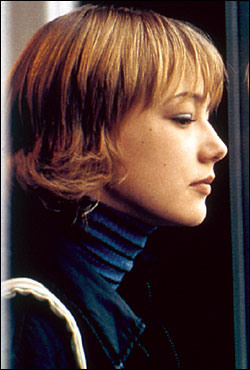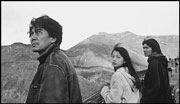The arrival of a prodigious filmmaking talent is rare enough that, even with luck and a little longevity, you’d be doing well to find a half-dozen over a lifetime of optimistic moviegoing. The odds picked up enormously last September when Andrey Zvyagintsev, an unknown 39-year-old Siberian director, won the Grand Prize at Venice for his first film, The Return (which opens Friday, April 2, at the Metro). Zvyagintsev seems to have it all: a great eye, painterly yet unsentimental; a gift for storytelling that carries The Return into the world of myth; and an ease with actors that may come from having been one himself. He also has assurance as powerful as he is close-mouthed about his themes, except to say that his film is “a mythological look at human life.” Mythological, absolutely—also direct, accessible, and universal.
Its prophetic opening, on a high, rickety wooden diving tower, introduces us to Andrey (Vladimir Garin), about 15, his cronies, and Andrey’s fearful younger brother, Vanya (Ivan Dobronravov) who’s about 12. All but Vanya manage the jump, but even taunts of “chicken” aren’t enough to get him into the water. He huddles in the cold twilight, sobbing until his mother climbs up to rescue him.
Next day, when even his brother calls Vanya “chicken,” the fight that erupts between the brothers is stopped by one sentence from their mother: “Be quiet, boys, your father’s home.” Unbelievable words for these sons who’ve spent 10 close years with no father in sight. Their slim, blond mother (Natalia Vdovina) takes the news with a cigarette and a remarkable amount of silent reflection.
From the bedroom doorway, the stunned boys peer at this powerful sleeping figure (Konstantin Lavronenko), splayed on his back, his bearded stubble graying at the chin. Then, almost in disbelief, they race to the attic and find, between pages of an illustrated book of religious stories, a single photograph, unmistakably of him, their mother, and themselves, when Vanya was about 2. (In a film as precise as this about its every image, it would be foolish to ignore the meaning of this book—and its semihidden location in the attic. Or not to recognize the father’s posture when we see it in just this position a second time.)
Dinner is quiet, ceremonial, the boys uneasily feeling out their positions in this new family constellation. Next morning, the man loads the two into his beat-up red station wagon for a few days of camping—combined with some mysterious “business.” (We’re not to know what has passed between husband and wife on the night of their first reunion. Rigor, rigor. Even the smallest bit of humor is excised, and have to say, it wouldn’t hurt.)
Privately, the boys are as hell-bent as we are to penetrate this man’s mystery. Andrey is satisfied to accept him and to connect, somehow, with the father he has imagined for so long. He contents himself with photographing everything and everyone around him, making this returnee “real” again. Whiny, sullen, and suspicious, Vanya is another story. His mother’s pet, he challenges this interloper at every turn, while his tantrums and sudden about-faces come dangerously close to exhausting our patience as well. Since Vanya will be at the heart of the film’s crucial action, all this ground- laying is as deliberate as it is risky.
Their handsome father is strong as a board, principled, demanding, and clearly the product of bitterly harsh years. If we begin to suspect prison, Zvyagintsev—again—isn’t saying, preferring at every turn to let us have our own interpretation. This man lives by a rigid code, and whether it’s from prison, the army, or the navy, it’s all the same to these boys, who chafe increasingly under his barked commands.
Meanwhile, they drive deeper into the Russian far north, with its endless horizon line and its lowering clouds. (Mikhail Kritchman’s cinematography of these jaw-dropping vistas gives the film the almost ecstatic closeness to nature you see in Andrey Tarkovsky or Larissa Shepitko, where nothing is simply for effect.) Fighting rain squalls and a mud-mired car, they camp and fish until, at a desolate boat house, their father hires a boat with an outboard, gives them their first survival lesson in caulking it with pitch, and steers them straight toward that horizon line, and an island he seems to know.
It would be wrong as well as useless to say more about the action, except to suggest that melodrama is the last thing to expect. When Zvyagintsev talks about mythology, here on this island, you can almost feel its roots under the sand.
What is fascinating, afterward, in the picture’s vivid afterlife, is to think back over the rough, touching attempts this emotionally armored and guarded father makes to reconnect with these sons, who must follow him to manhood soon enough. He does it with examples, not words, and sometimes brutishly, but as the strength in the film flows from one male character to another, it’s clear that he has been able to stamp them, in an elemental way, in his image and with his will to survive.
Zvyagintsev’s work with his three brave actors is masterful. Not a wrong note or an erratic glance passes between the boys, while Lavronenko’s work reveals layer after layer, each time you see it. It’s not a film for a single visit. In a tragic footnote, Vladimir Garin, who plays the older son, died in a swimming accident in the very same water just after shooting finished.
A final thought: I’ve heard audiences grumble over the director’s refusal to reveal a crucial “something” the father retrieves from the island. Nonsense. To do that (as the original screenplay did), would turn the film into something it isn’t: “the secret in the box” or what have you. This reticence may infuriate a few people, I trust the rest will be content with what is on the screen and with Zvyagintsev’s own words about over-explanation: “One should not talk about but suggest what is of real importance.” I’m with him there.








